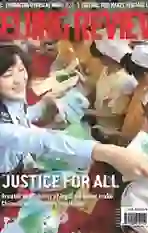Getting an Early Start
2015-08-18ByWeiYao
By+Wei+Yao
As opposed to other young people in Beijing who choose to relax after a weeks tedious work by going out for dinner, watching a movie or going to karaoke bars on Friday night, Luo Hao and his friends have opted for another way to spend their evenings. They take more than 20 children aged 4 and up on a nature discovery adventure in Beijings Olympic Forest Park north of the iconic Birds Nest stadium every Friday night. Each child is charged 200 yuan ($32.2) for a trip. The group tours through the woods and along a river with flashlights in hand, arousing curiosity from those taking a walk or enjoying the cool in the park.
On the riverbank, the 20-odd-year-old Luo holds a toad, telling his fellow pint-sized adventurers its scientific name and correcting the misconception that touching the animal could lead to poisoning or diseases. Several more daring children touch the back of the creature and become exhilarated, telling their peers nearby that its “slippery.” After instructing the children about the characteristics of the animal, Luo releases the “tortured” creature back into the water.
The humorous Luo is an avid fan of the discipline of natural history—the study and description of organisms and natural objects, especially their origins, evolution and interrelationships. Luo possesses profound knowledge in aquatic organisms, with his main domain of research centering on the native fishes of Beijing.
During childrens summer vacation in July and August, Luo and his friends who share his interest take their fellow explorers to the park every Friday night to observe and study animals and insects. In addition to teaching kids how to distinguish between the toad and the frog, they take the kids to look for adult cicadas, observe aquatic organisms, and sometimes, they even come face to face with hedgehogs. Their ventures average two hours, with teachers encouraging students to observe as many living creatures as they can. The teachers instruct the children in natural history using simple terms.
As China undergoes sweeping urbanization, peoples living environments have gone through tremendous changes. As a consequence, many urban children have little knowledge of animals in nature. Luo and his friends hope to help children get in touch with nature and learn more about the Earth we live on through these activities.
Luo and his team refer to such a way of getting involved with nature as a journey of natural history. They not only target children but also have taken some young adults on similar journeys to nature reserves at home and abroad to explore wildlife.
